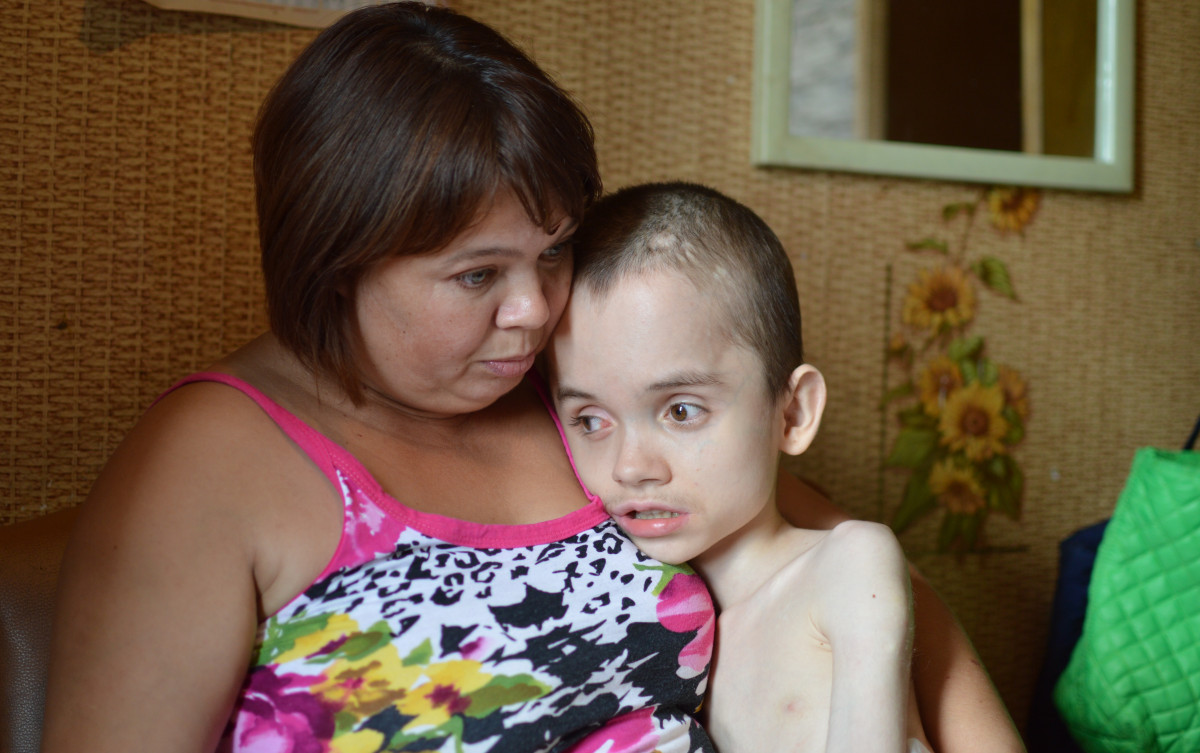“Meat is special food on our table,” Olga says as she describes her life with her disabled son close to the Eastern Ukraine front line
Published: Nov 8, 2017 Reading time: 4 minutes Share: Share an articleGeorgiy has recently turned 15. Since childhood he has been physically disabled. In his early years he was diagnosed with diabetes and started to lose weight. He is bedridden, not able to speak or move independently, and he requires ongoing assistance to do the most routine things. His mother Olga, 42, would be happy to work, even on low-paid jobs, but it is impossible to combine it with looking after her child. Her son requires constant attention and care. “He is my lovely 37 kilograms of happiness,” she says about her son. Even before the war the life with Georgiy and his brother was far from easy in the village of Artemovsk in Donbass, but due to the three year long conflict, they have lost their father, source of income, appeared in non-government controlled areas in Eastern Ukraine, and experienced how it is to live for weeks in a basement hiding from shelling.

Every day is a struggle for her son`s life
Olga realized very clearly that she will never have a real job. A few years ago when she got a job as a nurse, her son had another attack. It happened in her very first working day and Olga had to run to save Georgiy's life. "After this incident, my husband said that it’s not for me. Georgiy needs you," Olga recalls. Maybe her son felt that his mom, his closest person, would be away from home more often, especially when he needs her attention so badly.
"The other day, I couldn’t hear him breathing and he was so silent. I slapped him, but he didn’t react. His sugar level was at 2.5, which basically means “coma”. As a first aid, I carefully tried to feed him some sugar dissolved in water," Olga recalls agitatedly and explains that while regular children can signal when their sugar level drops, if they are sweating or rapidly become hungry, Georgiy will not say anything, he must be observed all the time.
Vitally important sugar level control
Olga worries about her son and checks his sugar level 3-4 times a day. The family spends around 690 rubles (24 EUR) to buy a pack of glucose test strips that only contains 25 pieces which equals almost all of their budget. This is not enough even for one month.
"It was terrible when we spent a whole week without test strips. I could hardly sleep and I was getting out of bed at night to check Georgiy. I prayed to God to help me make the right decision. I didn’t know if I should give him more or less food," Olga says. Such products as rice, peas, and pasta are not allowed for people with diabetes because they increase sugar level in the blood. "We did not have another food option so I had to feed Georgiy three spoons of rice, not the entire portion," Olga explains.
Not enough food for two sons
Times became even more difficult with the war. When Olga's husband died she was left alone with two children. The older son named Vova finishes school this year. He wants to become a firefighter or a psychologist. "Vova says to me that he will work three jobs at the same time so his family has everything they need," Olga shares, saying that since his father passed away, Vova has has to give up on many things but his help is indispensable for his mom.
Georgiy loves his older brother and this is mutual. He smiles and shines when Vova comes to play with him. "One day I bought four sausages – two for each and Vova asked if he could leave his share for Georgiy," said Olga. There was a time, Olga says, when she had to decide which of her sons is getting to eat this time and who skips. She recalls that once her husband brought a few kilograms of chicken legs and they grilled them and ate as much as they wanted. Now they would use one leg of the same for a soup, porridge, and two more dishes. Meat is rather a special food on their table. To make ends meet, Olga is forced to borrow money from neighbors and friends.
Into the basement with disabled child
"What is our fault?," Olga asks recalling the worst time in the beginning of the war. "In 2014 and 2015 we were just trying to stay alive. We survived because we planted beetroots, carrots, and potatoes at our dacha, and we could have vinaigrette (vegetable salad). The shops were empty, in fact, people did not have any money and there was nothing to eat. “In those days, my husband developed an ulcer," Olga says. It was a time of unceasing shelling. Olga’s family together with their neighbors did not come out of the basement of their multi-story building for days.
"Everything was prepared there, even a gas stove. Instead of a tea we would make a drink of raspberry and cherry leaves and we were cooking oatmeal for Georgiy. Other people used to have only one piece of bread as a snack, but he needs a special diet," said Olga. With fear in her eyes, Olga remembers her and her sons sitting in the cold and damp basement and hopes this will never happen to them again.
Olga’s family was supported in terms of ACCESS consortium (People in Need, Action Contre La Faim, Médecins du Monde, and ACTED in partnership with IMPACT Initiatives) funded by the EU Civil Protection and Humanitarian Aid Operations. They received food and hygiene kits so they can save some money for other family expences.







